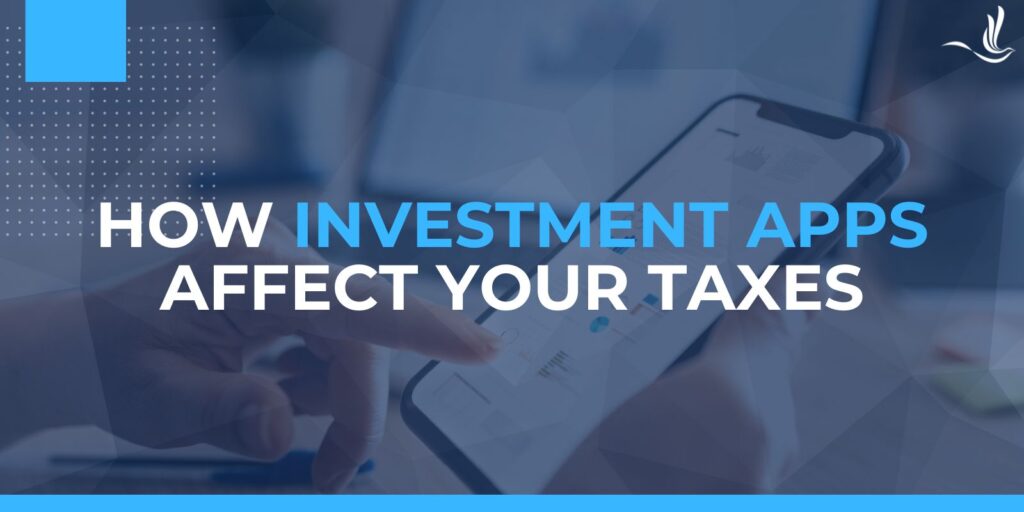
As technology continues to reshape the financial landscape, investment apps have become increasingly popular tools for individuals seeking to grow their wealth. These apps provide a user-friendly interface for managing investments, offering convenience and accessibility. However, as with any financial endeavor, it’s crucial to understand the tax implications associated with using investment apps. In this article, we will explore how these apps can affect your taxes and what considerations you should keep in mind.
What Are Investment Apps?
Investment apps are mobile applications that facilitate and streamline the process of investing. These apps offer user-friendly interfaces and access to a range of investment options. They allow you to manage portfolios, buy and sell securities, and monitor market trends from the convenience of your smartphones or tablets. Some common types of investment apps are:
- Robo-Advisors: These automated investment platforms use algorithms to provide financial advice and manage investment portfolios of ETFs (Exchange-Traded Funds). Examples of robo-advisor apps include Betterment and Wealthfront.
- Stock Trading Apps: These apps enable users to buy and sell individual stocks, often with low or zero commission fees. Examples of stock trading apps are Robinhood, E*TRADE, and TD Ameritrade.
- Cryptocurrency Apps: These apps help buy, sell, and manage cryptocurrencies. Examples include Coinbase, Binance, and Kraken.
- Micro-Investing Apps: These apps allow users to invest small amounts of money, often by rounding up purchases or contributing spare change to investments. Examples of these apps include Acorns, Stash, and Qapital.
- Retirement Savings Apps: These apps help users save for retirement by offering Individual Retirement Accounts (IRAs) or similar retirement investment options. Examples include Wealthsimple, SoFi Invest, and Fidelity.
Capital Gains and Losses
One of the primary ways investment apps influence your tax liability is through capital gains and losses. When you sell an investment for a profit, it results in a capital gain, and conversely, if you sell at a loss, you incur a capital loss. Investment apps provide a platform for buying and selling securities, and the transactions made within these apps have tax implications.
Capital gains are generally categorized into two types: short-term and long-term. The holding period for an investment determines its classification. Short-term gains, from assets held for one year or less, are typically taxed at a higher rate than long-term gains, which are from assets held for more than one year. Understanding these distinctions is crucial for accurate tax reporting.
Dividend Income
Many investment apps offer users the ability to invest in dividend-paying stocks or funds. Dividends received from investments are considered taxable income. The tax treatment of dividends depends on whether they are classified as qualified or non-qualified. Qualified dividends are generally taxed at a lower rate, aligning with long-term capital gains rates, while non-qualified dividends are taxed as ordinary income. Investors need to keep track of their dividend income generated through investment apps and report it accurately when filing their tax returns.
Tax Efficiency Tools
Some investment apps offer tax-efficient features designed to minimize tax liabilities for investors. For example, tax-loss harvesting is a strategy certain apps use to offset capital gains with capital losses, helping investors reduce their overall tax burden. Additionally, automated tax documentation and reporting features simplify the tax filing process for users. While these tools can be advantageous, investors should thoroughly understand how they operate and consult with tax professionals if needed to ensure compliance with tax regulations.
Reporting and Documentation
Accurate and timely reporting is crucial when it comes to taxes. Investment apps typically provide users with annual tax documents, such as Forms 1099, summarizing their investment activities throughout the year. These documents include information on capital gains, dividends, and other relevant transactions.
Investors must carefully review these documents and incorporate the information into their tax filings. Failure to accurately report investment income and transactions can lead to penalties and complications with tax authorities.
State and Local Tax Considerations
In addition to federal taxes, investors using investment apps must be aware of state and local tax implications. Tax laws vary across jurisdictions, and some states may impose additional taxes on investment income. It’s essential to research and understand the tax regulations applicable to your specific location.
Tax Help for Investors
Investment apps offer a convenient and accessible way for individuals to participate in the financial markets. However, users must be aware of the tax implications associated with their investment activities. Proper record-keeping, understanding the tax treatment of capital gains and dividends, utilizing tax-efficient tools, and staying informed about state and local tax regulations are essential steps to navigate the complex intersection of investment apps and taxes. Seeking advice from tax professionals can enhance your understanding and help you optimize your tax strategy. Optima Tax Relief is the nation’s leading tax resolution firm with over a decade of experience helping taxpayers with tough tax situations.
If You Need Tax Help, Contact Us Today for a Free Consultation